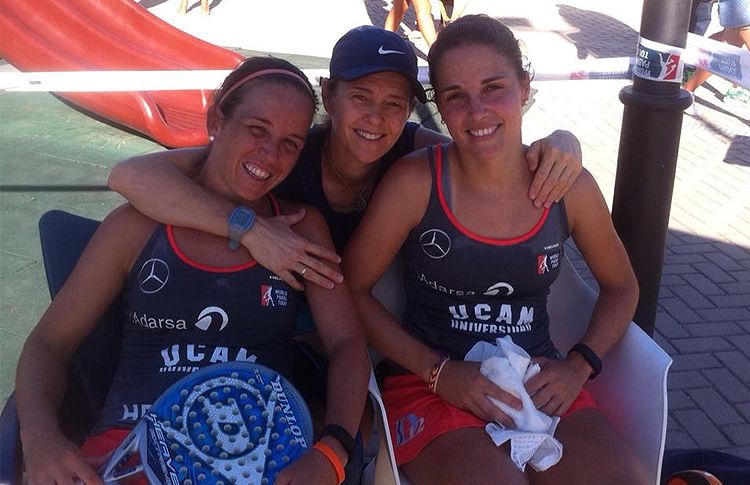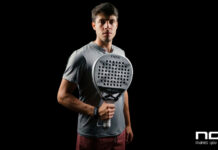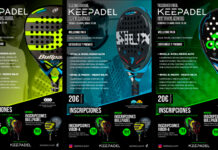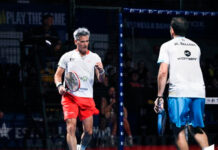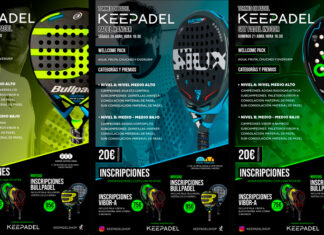Do not miss the second installment of the extensive interview that, together with our partner Daniel Gamarra Peñalver, we had with two of the best players in the World Paddle Tour Circuit. What have you learned together in these almost five years as companions? What have they changed since they joined their paths? What do you think of the evolution of the women's padel in recent years? Do not miss everything they told us.
Padel World Press .- Just a few days ago we showed you the first part of our interview with the members of the couple number 3 of the WPT Ranking, in which they talked about their preseason, about their desire to start competing and how they faced the start of the new season.
Then, we leave you with the second part of this interview with our colleague Daniel Gamarra Peñalver ... 'Knowing Patty and Eli'.
What does it mean to have Neky in this adventure?
Eli: It is difficult to reduce what Neky brings us. Personally I have not had the opportunity to work with many coaches because I met Neky very early, she was my second coach, but I have to say that the moment I met her I knew she would bring me something different. In these years, she has taught me to be a better player but she has also helped me to be a better person. All his teachings are valid for life and he always emphasizes that paddle tennis is a beautiful excuse to know oneself, it is a form of self-knowledge, it serves for a person to lean on their talents and know how to face their fears. On a personal level, it has helped me understand life from a calm perspective, from daily work and from love of oneself. Neky knows us so well that sometimes, in games, he doesn't tell us anything technical or tactical; she only touches the emotional part and that is what we need and what makes the difference.
Patty: In addition to what Eli has said, I would emphasize that Neky has been a player until 8 years ago, therefore she knows what we go through in each game and in each training session. Both Eli and I have blind confidence in what Neky tells us. She, from the outside, clearly sees many things that one cannot see from the inside and that always helps a lot. Many times, when things go wrong and you think you can't, she encourages us to continue and achieve our goals.
What moment do you remember with more affection as a couple? What time has been hardest?
Eli: The good ones are easy. I keep the World Cup in Mallorca with great affection, the La Nucia match in the semifinals against Alejandra and Marta or when we got the number 1 in the world in Valencia, which we celebrated so much that the next day we didn't get the ball, hehehe. But there have also been bad and many. We have come out of games very touched. The good news is that one usually goes wrong and the other not so bad, so we support each other. As a couple we have never had a moment in which we wanted to throw in the towel but there have been games in which we have had a bad time. It may be just a paddle game but it is something that removes many things from the inside ... You have to be very clear about things to realize that you are not what you felt at that moment. Athletes go through bad times, in which we come to question whether we are worth competing. It is in those moments when we have to have people by our side who tell us that we are not what we have done at that time. I am me, play well or play poorly, whether I am number 1 or not… Having considered these things, I think it has made me more complete, it has made me grow and I no longer sink when I lose or believe the best when I win . I try to always have the same value.
Patty: In the bad moments I have come to feel very bad, but little by little, and over the years, I've realized that everything happens ... The next day the sun will come out again in the same place. Winning or losing is only a momentary action.
What have you learned from each other in this time? What have you improved the most as a couple? What are the differences between the Eli-Patty couple from 2011 and the one from 2016?
Eli: I from Patty have learned to enjoy paddle and life. She always has a good time. It has the ability to adapt to situations and enjoy wherever it is ... It's something that amazes me. Also, on the track, he is a super hardworking person, who gives everything every day.
Patty: Eli is the most hard-working and persevering person in the world; he proposes something and does it. Eli is order, discipline and work capacity. I considered myself more disorderly and since I've been with her I consider myself a little more orderly than before. On the track I think we have gained a lot in maturity and communication. We no longer need to say anything to each other, we simply look at each other and know what each one needs at each moment of the game. The paddle tennis court is such a small space that the better you get to know the person next to you, the better.
Eli: Internally, we have the feeling of being much more complete than at the time. Many times they tell us that as before we were number 1 and we are couple 3 we have had to drop in performance ... But it is not like that. I keep the Eli-Patty from now.
When you decided to play together, Eli spoke of your union as a long-term project in which the important thing was the good feelings, not the results. Do you keep that philosophy?
Patty: Totally.
Eli: I have always thought that if the sensations are good, the results will come or will be to come. The only thing necessary is that the motivation is within the couple; Rankings are something very external. For me, the important thing is to feel good playing with the person next to me and if I add to that the daily work, I think we will be a little closer to the results.
How do you manage to beat players who are more punchy and aggressive on the net than you are? What makes you different from other couples?
Patty: The trick is to take the game to our field, to an area where we are more comfortable. We are not stuck but we are working in the preseason a lot in our attack, to be able to exploit that aspect if in the matches we are presented with that circumstance.
Eli: We are a couple aware of our strengths and weaknesses. In each tournament we learn from the virtues of the rivals and we try to incorporate them into our game, but at the same time we try not to compete in what they are best at. On the other hand, we believe that knowing how to control the rhythm of the game takes on a vital aspect in paddle tennis. It may be a less visible part than a hit, but it is very important in our way of seeing this sport.
How do you see the other couples on the Circuit? Do you think there are any couples one step above the rest?
Eli: At the beginning of the season we might be at the same level as the first two couples but, nevertheless, I think that at the end of the season both the Twins and Marta Marrero and Alejandra Salazar made a bit of a difference with the rest. Regarding the new couples that have been formed, such as Alba and Marta or Lucia and Gemma, I think they are going to be very tough. I think that this change they have made has been very good for them, since when a new pair is formed, the predominant factor is illusion, which is very important in a sport. But we cannot forget the usual couples, like Carol-Ceci or Victoria-Cata. Patty and I don't like to talk about couples in particular as we respect everyone from the first match. Today all the girls train very hard, they all want to get to the top, they have a lot of desire and a lot of enthusiasm, they want to be part of the elite of women's paddle tennis, which I think is very positive. It is for that reason that we respect everyone. We value the daily effort you put into being there.
What is the most important for a professional paddle tennis player, the physical, technical or mental aspect?
Eli: In my opinion, it is the psychological part that makes the difference. Emotion management decides that couples earn more and that couples earn less.
Patty: A professional paddle tennis player must ask herself internally what she wants to give of herself, how far she wants to give and how much she wants to give. It is the player herself who must set her own goals.
How has the female padel evolved in your eyes in the last decade?
Patty: I've been playing this for many, many years, almost 20 already. The padel of today is faster, we must be more physically prepared ... The ball speed is much faster but I think the essence of the origin is still present. I was from the paddle before, the fence, the spikes, the cunning and the wall track. For that reason, I love paddle to look for angles, I think that is the little seed of paddle and should not be lost, I hope we do not change the balls or the tracks anymore because then this would no longer seem like paddle.
Eli: I think the padel evolves when former players of tennis, who bring another rhythm and another ball speed. We must adapt to that as much as possible, without losing that little bit of paddle from before.
Photos: Facebook Patty Llaguno
* You can follow all the news of the world of paddle in our profiles of Facebook y Twitter as well as subscribe to our Newsletter .

